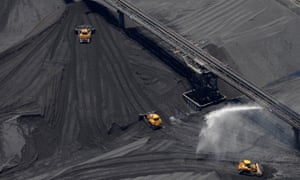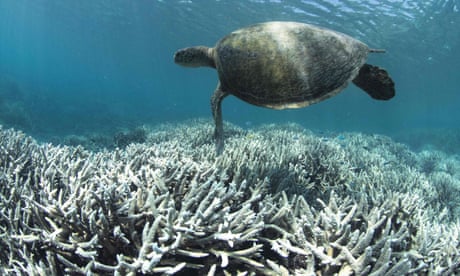Political parties that dither on tackling climate change do so at their own electoral peril if two polls out this week pointing to rising voter concern are any guide.
The Lowy Institute's annual poll on Australian Attitudes to The World surveyed 1202 adults earlier this year and found support for taking action to curb global warming "even if it involves significant costs" to be at its highest since 2008, up 17 percentage points to 53 per cent after hitting a nadir in 2012. (See chart below.)
"This is a result which puts climate policy firmly on the agenda for whichever party wins government on 2 July," Michael Fullilove, Lowy's executive director, said in a statement.
A separate poll out on Wednesday from the Climate Institute found a similar rebound from 2012, with almost two-thirds wanting Australia to be "a world leader in finding solutions to climate change". (See chart of results below.) The survey was of a similar size, covering 1100 people at voting age, conducted earlier this month. Those calling for Australian leadership is also at its highest level since 2008.
Among voters, 72 per cent say they are either very or fairly concerned about climate change and only about 7 per cent say they are "not at all concerned", the Climate Institute survey found. That was up from 53 per cent and 12 per cent, respectively, in 2013.
Coalition shift
Among those disclosing party support, Coalition backers have shown the most notable shift, with 62 per cent saying they were either very or partly concerned about a warming world, up from 41 per cent in 2013 - at the height of the carbon tax debate.
For Labor supporters, concern about climate change was 79 per cent, up from 63 per cent three years ago. Some 96 per cent of Greens supporters are either very or fairly worried about climate change, up from 84 per cent in 2013.
Climate change issues have increasingly featured in the past year, including the 2015 Paris climate summit in which the Turnbull government signed up with other nations to commit to trying to stop global temperatures rising 1.5-2 degrees above pre-industrial levels.
Those global temperatures, though, have been breaking monthly records for the past 13 months, US agencies say, with May the latest to set new highs. Australia has also had its warmest start to any year and autumn posted the biggest departure from long-term averages for any season on record, the Bureau of Meteorology said earlier this month.
While the El Nino climate system has given global temperatures a boost in the past year, the spurt has been built on background warming as rising greenhouse gas levels trap more solar heat that would otherwise have radiated back to space. Cape Grim, the longest-running monitoring site in the southern hemisphere recorded 400 parts per million of carbon dioxide last month, up from about 280 in pre-industrial times and the highest for about four million years.
Extreme weather events are among the triggers for increased voter concern about climate change, with two-in-three polled saying they believe such events will prompt increases in the cost of living, the Climate Institute survey found. About 60 per cent of Coalition supporters were concerned.
The severe bleaching of the Great Barrier Reef this year which may have killed about a quarter of the corals, has also contributed to the climate concerns of two-thirds of those surveyed, although the share drops to 55 per cent for Coalition backers, the poll found.
Voter doubts
| We've had the warmest start to any year. Photo: Leigh Henningham |
The Coalition is yet to announce what share of renewable energy Australia should have by 2030. The current bipartisan-backed 2020 Renewable Energy Target aims to deliver 33,000 gigawatt-hours a year of solar, wind or other renewable energy by the decades end.
Labor's policy, which would aim to cut Australia's 2005-level carbon emissions by 45 per cent and derive 50 per cent of electricity by 2030, is considered effective by only 40 per cent of Labor supporters, the Climate Institute survey found.
The Greens support cutting emissions by 63-82 per cent on 2005 levels by 2030 and net zero pollution by 2040.
"Our research shows that all our political parties need to do more to develop policies that not only build credibility but also build community and investor confidence," John Connor, chief executive of the institute, said.
The Lowy survey also found significant support for renewable energy, with 88 per cent of those polled saying use of fossil fuels "is in decline around the world and Australia should invest more in alternative energy sources or risk being left behind". (See chart below.)
While almost four in five Australians think we should cut reliance on fossil fuels, a slim majority - or 53 per cent - said Australia should continue to use and export them "to keep our economy strong".
"Our poll results over the last two years confirm that most Australians are looking for a future beyond fossil fuels, but there are deep divisions over how to achieve this," Alex Oliver, the poll's director, said.
While only 15 per cent of those polled by Lowy found climate change to be "not important", that ranking was enough to push it down to equal eighth of 10 "important issues facing Australia", on a par with immigration and just behind refugees and asylum seekers. Education and health topped the list.
Links
- Heatwaves in Australia
- Malcolm Turnbull risks Australia's economy with inaction on climate change
- Australia scrubbed from UN climate change report after government intervention
- Political Leaders Urged To Take Action On Climate Change And Prevent Devastation To Regional Economies
- Scientists, Business Leaders And Prominent Australians Call For Emergency Climate Action
- Climate Emergency Declaration Petition




